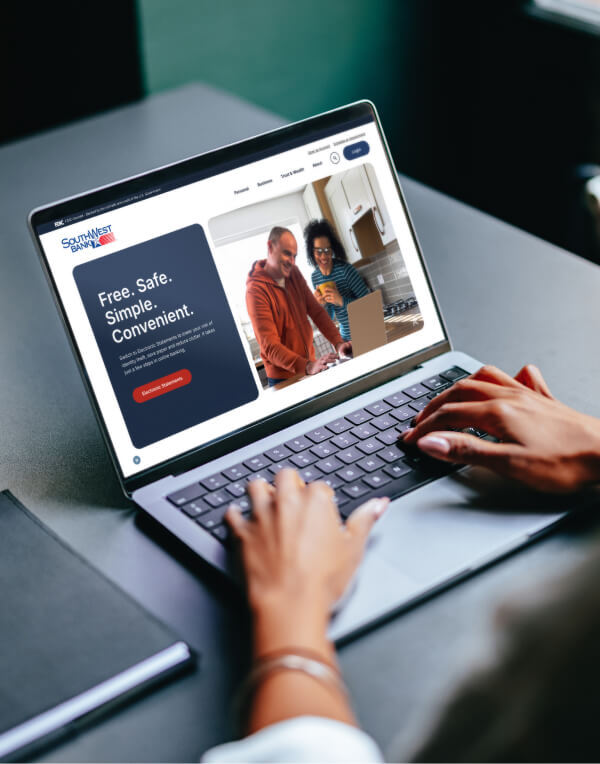Are you ready to start up your business idea and become an entrepreneur? Before you can call yourself a small business owner, you’ll want to make sure your business solves a real problem, has a plan and can get funding. Follow these steps to turn your startup idea into a thriving small business in Texas. When the time comes, SouthWest Bank’s team is ready to help.
- Develop a Business Plan
Before kicking off a startup business, you will need a realistic and balanced business plan. Begin your planning with market research. When exploring your prospective industry, pinpoint potential customers and already established competitors. The goal of your market research should be to find the unique advantage your business will provide.
Once you have formed a realistic business goal, start putting together your business plan. The Small Business Administration (SBA) offers helpful advice on what to include in your business plan. You’ll then want to connect with a qualified small business advisor to refine your small business plan.
A solid business plan is crucial in the startup phase and will become helpful in the growing phase. Plus, many business loan officers base their lending decisions on business plans to assess risk. - Estimate Your Business Expenses
As the saying goes, it takes money to make money. When it comes to small business funding, there are several paths you can take to reach your goals. Some, however, come at a higher risk than others. Before calculating your startup costs, the SBA suggests identifying your small business as one of the following three types: Brick and mortar, Online business, Service
There are a variety of factors to consider across all three types of business. These factors include but are not limited to, office space, equipment, communication tools, salaries, marketing strategy and printed and digital material.
Capital expenditures and one-time payments will also play a role in financing a small business. For example, you may need financing for inventory, commercial property or vehicles, depending on the nature of the business you are pursuing.
The SBA helps you calculate your startup costs based on the above factors. Find out how much you can afford by comparing your costs to your assets to see if you can self-fund, or if you’ll need to borrow or raise capital from investors. - Financing Options for Your Small Business in Texas
Most small businesses don’t have access to venture capital or “angel investors,” individuals who help provide capital for startups, and choose to self-fund or apply for business loans. Here are the key things to keep in mind when deciding between self-funding and borrowing to launch your business.
a. Self-Funding Your Business
The SBA defines self-funding as taking on all financial risk yourself. If you’re looking to bootstrap your own business, then you’ll need to tap into your own money from a checking account, savings account or 401k. You may also choose to fill in the gaps by borrowing money from family or friends.
Keep in mind that self-funding means you take on all the risk personally. If this is something you are considering for your business, it’s important to budget for fees and damages that could come unexpectedly in the early years of your business. Consider opening a business savings account for these expenses and access our retirement calculators to understand the potential impact on your retirement savings.
b. Borrowing Money to Start Your Business
Another option to help launch your startup is to take out a business loan with SouthWest Bank. Small business loans allow entrepreneurs to start businesses they might not be able to self-fund.
Before applying for a business loan, we recommend meeting with a business loan officer, like the ones on SouthWest Bank’s commercial lending team. Prepare for this meeting by obtaining your current credit score, firming up your business plan, and listing out expenses and financial projections for at least the next five years. Our commercial lending team can help you get organized before applying for your loan.
c. Determine Your Legal Business Structure
Before you register your business in Texas you will need to determine the most appropriate legal business structure: LTD, PC, Corp. or LLC. How you structure your business will affect how much you pay in taxes, the paperwork you will need to file, and your personal liability.
Common business structures include sole properties, partnerships, limited liability companies (LLC), C Corporations, S Corporations, B Corporations and nonprofit corporations. You will need to do thorough research and compare the general traits of these business structures in Texas to determine which is best for you. - Choose a Location for Your Business
Whether your startup is a physical business, a service or an online business, you must choose a location for necessary licensing and permits. Choose wisely, because your business location determines how much you’ll pay in taxes, what federal and state licenses you will need and the permits and regulations that will apply to your business.
Associated fees will vary based on the nature of your business, location and local governments. The SBA provides a list of general federal licenses and permits. Look to see if any aspect of your business activity is listed, then check with the appropriate federal agency to see how you should apply. - Open Your Business Bank Accounts
Before you begin spending or accepting money on behalf of your Texas small business, you’ll want to open a business bank account. There are many benefits to having a business bank account, including the ability to separate your personal and business finances and ensure accurate bookkeeping.
To open a business bank account, you will need to provide proof of business identity and address, as well as proof of identity for all responsible individuals involved in your business. You will also need your Employer Identification Number (EIN). If you are the sole proprietor, this would be your Social Security number.
Starting a business can be both exciting and intimidating, but if you have solid plans in place, you can achieve your dreams. Lean on our business banking team to guide you through the small business planning and funding process.
Our SBA lending experts can help guide you through the process of planning and funding your business. Contact us online or visit one of our West Texas locations to schedule an appointment.


